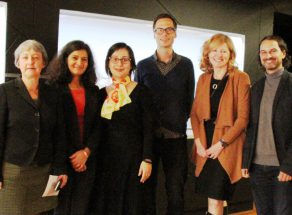Work is underway on a new digital platform that will enable councils to capture and analyse conversations on social media as a means of improving community consultation on major projects.
The study involving two councils and a team of urban planners, policy experts and data analysts aims to ensure the “citizen voice” helps to drive smart city initiatives.
NSW’s City of Canada Bay and Queensland’s Logan City Council are participating in the project being led by the University of Sydney’s Smart Urbanism Lab and supported by the Commonwealth’s Smart Cities and Suburbs Program.
While there is sometimes a perception that smart city initiatives are led by technology, Dr Tooran Alizadeh, director of urban design at Sydney University’s school of architecture, said the project aimed to find a new way of “crowd sourcing” opinion on key local government initiatives.
“The conversations about the hot urban projects of the day are already happening in the public online domain, and we are essentially gathering them, categorising them and feeding them back to local governments,” she told Government News.

The project, which involves the development of algorithms and tools to capture this information, will produce two dashboards – one for local government and one for the public.
“The fact we’re now building the citizen voice means we have a responsibility to feed that back to the public and tell people we heard them… it’s useful for individual members of the community to know the diversity of opinion,” Dr Alizadeh said.
The study will scrutinise social media feedback around two key projects for each of the participating local governments: Cronulla Park and the Yarrabilba development for Logan, and Parramatta Road and Five Dock for Canada Bay.
The dashboard will be fed by the live conversations happening on Twitter and Facebook, as well as those captured in reader comments on news sites’ coverage of the projects.
“It will be useful on two levels,” Dr Alizadeh said.
“The first is the live conversation which is important if they have a sudden issue or problem. The second is a longitudinal benefit because the longer we collect the data the more we will hopefully be able to make sense of the things that trigger reactions over the life of a project,” she said.
People’s attitudes towards urban projects and issues are usually dynamic, “so the only way we can make sense of them and how they change is if you keep an eye on it over a longer period,” she said.
Dr Alizadeh said the project would utilise the diverse skillset within the newly established Smart Urbanism Lab, which has staff expertise in urban planning, geography, policy making and big data.
An early version of the dashboard is expected in the next two to three months for the participating local governments to comment on, while the project is slated to conclude next May.
Logan City Council’s innovation committee chairperson, councillor Laurie Smith said social media presented a new opportunity to increase the reach of community consultation on planning and development.
“This gives residents another option to have their say on how their city develops and to feel included in council decision making,” she said.
Comment below to have your say on this story.
If you have a news story or tip-off, get in touch at editorial@governmentnews.com.au.
Sign up to the Government News newsletter.




Leave a Reply